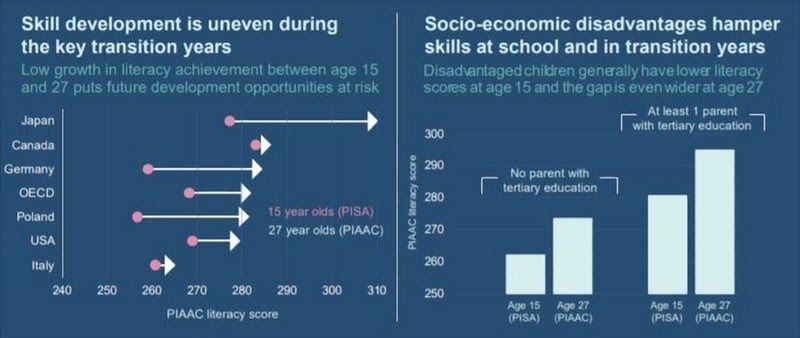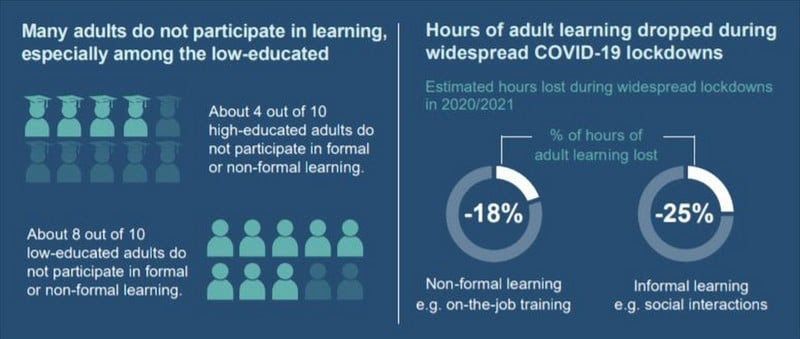
Continuing education: necessity or virtuosity?

According to the OECD, continuing education is an absolute necessity in the field of occupational skills
We have already talked about continuing education, or lifelong learning. The economic and social context generated by the pandemic has further modified the skills and competencies required of workers.
The OECD's Skills Outlook 2021, which explores the importance of lifelong learning, shows that lifelong learning and the ability to "learn to learn" are essential to empowering individuals to learn the skills needed to address the economic, labor, climate and demographic changes that are transforming our society.
Workers need continuing education to maintain, update and expand their skills to adapt to the environment, but also to anticipate technological developments.
Digitization and automation of some tasks make some useful skills less relevant to routine tasks.
According to the OECD, this phenomenon, even before the pandemic, was destined to cause the disappearance of 15% of currently existing occupations, while a 32% would require the reorganization of tasks and the learning of new skills by employees.
Post-Covid Continuing Education
Digital acceleration has grown exponentially with the pandemic, in turn increasing the urgency of training pathways: not only is it necessary to learn in order to adapt to the current context (very different from that of just two years ago), but it is also vital to learn in view of future, long-term changes (looking ahead to the next 15-20 years).
Positive attitudes toward learning are formed as early as childhood and foster ambition and career opportunities in young people, net of pre-existing socio-economic disparities.

Among young people in OECD countries, differences in the development of new skills have been shown to be related to the number of Neet (Neither in employment, education or training), i.e., inactive youth (who do not have and do not seek employment and are not involved in school or vocational training). Before the pandemic, one in two adults was not involved in training.
Remember that the level of education is among the determinants of lifelong learning success: less educated workers (elementary school or lower secondary school qualification) are twice as likely to be excluded from training in adulthood.
It is not excluded that the pandemic could lead to an increase in school dropouts. This could mean that, in the medium and long term, today's young people may not be able to develop the positive learning attitude that is so useful in dealing with change, updating their skills day by day, throughout their lives.
In addition, the pandemic has limited the opportunities for participation in vocational training: in OECD regions, formal learning opportunities (in schools or training centers) have decreased by 18%; while informal learning opportunities (through peer-to-peer comparisons or the use of corporate training) have decreased by 25%.

In the context of digital training, where social interaction has certainly been reduced, it is clear that the prerequisite for access to training are digital skills and intrinsic motivation.
The labor market
The pandemic has had massive effects on the labor market. OECD data show that:
- compared to early 2020, the month of May 2020 saw a 40% drop in online postings of open corporate positions
- during the same period, job postings by companies seeking remote workers increased
- between March 2020 and March 2021, listings requiring a high school diploma or earlier declined more significantly than those requiring higher levels of education.
Planned investments in green and renewable technologies will increase the demand for specialists in these areas, creating skills gaps that continuing education systems will be called upon to fill.
However, compounding the difficulty in developing these systems is the increasing reliance by employers on short-term contracts, which leads to less interest in providing continuing education pathways for employees, as well as increasing the number of skills employees must learn to remain competitive in the marketplace.
The role of soft skills
In this context, interpersonal and soft skills are also increasingly in demand.
The most in demand in job ads?
- communication
- teamwork
- organizational skills
- analytical skills
- problem solving
- digital skills
- leadership
- public speaking
How to set continuous training in motion
Policies to promote continuing education have become necessary in order to meet the needs of individuals, businesses and produce benefits for society as a whole. One European example we discussed in a previous article is the PNRR.
Policies aimed at continuing education should place the learner at the center of the process, diversifying the contents and modes of learning, but also making the individual responsible for achieving his or her goals and giving him or her information about the profession, the skills needed upstream, salary and career expectations and the work-life relationship.
The OECD report stresses the importance of reducing the number of Neet through skills training, guiding the transition between the end of compulsory schooling and the insertion of young people into the labor market.
Clearly, this must be a shared effort among individuals, employers, schools, governments and the broader community, including removing barriers to entry for socially and economically disadvantaged groups.
The role of employers in continuing education is indispensable. For this reason, policies will need to provide tools to support employers (including the self-employed and SMEs) through funding formulas that incentivize employers to invest in learning.
Translated with www.DeepL.com/Translator
Did you like this article? Sign up for the newsletter and receive weekly news!
Subscribe to NewsletterComments:
No comments are in yet. You be the first to comment on this article!